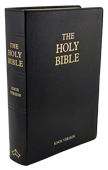The Holy Bible – Knox Translation
The Prophecy of Osee
|
Chapter 12
|
1
Ephraim, that would still play shepherd to the wind, still hunt in the track of the storm, and nothing hoard up but treachery, nothing but his own ruin! See him making treaties with the Assyrian, sending tribute of oil to Egypt!
2
On Juda’s part the Lord takes up the quarrel, will call Jacob to account,✻ for ill deeds and ill designs rewarding him.
Literally, ‘And there is a quarrel to the Lord with Juda, and to the calling to account of Jacob’. In view of 11.12, it does not seem likely that the Lord’s quarrel here is against Juda.
3
Here was one that took precedence of✻ his brother even in the womb; strength was his, of celestial strength the rival.
‘Took precedence of’; literally, ‘dogged the heels of’. The incident related in Gen. 25.25 is cited here as an example, not of Israel’s treachery, but of God’s favour for his own people.
4
Did he not hold his own in contest with an angel, and prefer, with tears, his suit? Ay, and what of that encounter at Bethel, when the promises came to us
5
from him, the Lord of hosts, from the God whose name we remember yet?
6
Wouldst thou to thy God return? A tender heart keep thou must, and a right mind, and wait for thy God’s help continually.
7
Is it the Chanaanite that carries false weights, and loves ill gotten gain?
8
Here is Ephraim boasting that he has grown rich, has found a false god to worship; will not these earnings of mine, thinks he, buy me out from the punishment I have deserved?✻
The meaning of verses 7 and 8 is obscure, and much disputed.
9
I, the Lord, thy God in Egypt, and thy God still! Once again thou shalt dwell in tents, as in the days when I kept tryst with thee;✻
That is, when the Tabernacle of Appointment went with Israel through the desert. Or, possibly, the sense may be ‘as in the days of solemn observance’, i.e. the Feast of Tent-dwelling (Lev. 23.34).
10
once again I will bestow✻ utterance upon the prophets. Mine it is, by the prophets’ means, to grant clear vision, to speak in parables.
The Latin version here has ‘And I used to bestow’; but a reference to the past seems out of place here.
11
If Galaad is all idolatry, vain the sacrifice of oxen that is made at Galgal; stone heaps their altars shall be, out in the plough-lands.✻
The language of this verse is strained, and the sense doubtful; some think there is an error in the manuscripts. The Hebrew for ‘stone-heaps’ is gallim, and there is possibly a play upon words.
12
Time was when Jacob fled to the Aram country; Israel worked for a wife, and for that wife’s sake loyally kept his troth.
13
Time was, when the Lord rescued Israel from Egypt by a prophet’s means, and, for that prophet’s sake loyally preserved them.✻
Little can be said for certain about these verses, except that those editors are wrong who would print verse 12 after verse 5, and verse 13 after verse 10. Evidently they must be taken together, but it is hard to see the force of their minute parallelism; possibly there is an allusion to Assyria and Egypt as places of exile; cf. 11.11.
14
For bitter jealousy of mine Ephraim must pay the penalty; spurned Master spurns him now.


